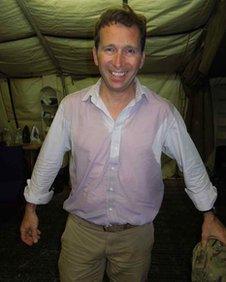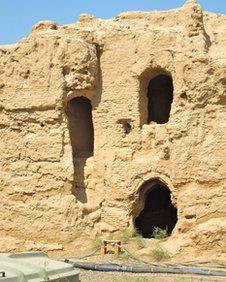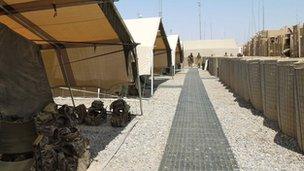Afghanistan diary: Days 1 to 4
- Published
Royal Anglian soldiers are training and mentoring their Afghan counterparts
BBC Look East Defence Correspondent Alex Dunlop and cameraman Shaun Whitmore are spending a week in Helmand Province.
Some 1,500 troops from the eastern region are embedded in Afghanistan, mostly in Helmand.
They include 1st Battalion The Royal Anglian Regiment, bomb disposal teams, RAF air and ground crews, medics, reservists and the Norfolk-based Light Dragoons.
Friday
Four years since I was last here, Bastion has changed hugely and also hardly at all.
In the middle of the desert, 20 miles north-west of Helmand's provincial capital Lashkar Gah, the camp is now far bigger - the size of Luton if you include the outer perimeter.

Alex is "drenched in sweat" in temperatures above 50C
But it's also very familiar, with the same media tent, same dusty grid of wide roads, same shops, the same oven-like temperature.
You cannot arrive in Camp Bastion without completing a week-long hostile environment course, battlefield first aid and full medical.
Shaun and I now have to undergo a further half-day course before we are allowed out of Bastion and on to the Forward Operating Bases (FOBs).
We were rolled 360 degrees in a darkened simulator while wearing full body armour, to give us some idea of how to escape an armoured wagon when it hits a roadside bomb or rolls over.
They call this Rodet (Rollover Drills Egress Training). Many more acronyms to come.
Saturday
We jump on a Merlin helicopter and fly fast and low over the desert, then head down south towards the Green Zone, an agricultural area replenished by canals which feed off the Helmand River.
This is where most of the population is based, and where hearts and minds need to be won over.

Shawquat is within the mud walls of an 18th Century fort
The theory is that if you give people the infrastructure (roads, schools, hospitals) within a secure and safe area, the insurgency will be increasingly marginalised.
Judging by the throng in the market place, so far it seems to be working.
Commanding Officer of 1 Royal Anglians (the "Vikings") Mick Aston tells me: "It's the non-uniformed population who will win this," he said, "not us".
The tented accommodation at FOB Shawquat is within the broken mud walls of an 19th Century fort, once occupied by British soldiers in the second Afghan War.
The locals call it "Farangi Qala", Castle of the Foreigners.
It survived the past 140 years pretty much intact until the Taliban bombed it a few years ago.
The Anglians expect to leave this fortress and head for home by October.
We head to bed with the sound of gunfire not far away. Soldiers here barely notice it.
Sunday

Alex says Shawquat is "pretty civilised" with air-conditioned tents
The FOB is pretty civilised. All accommodation is tented and mostly air-conditioned, and there are hot showers, a gym, TV room and cookhouse.
We had steak followed by cheesecake for dinner last night. No alcohol allowed, so washed down with iced tea.
The Vikings Battlegroup share the base with up to 200 ANA (Afghan National Army) soldiers.
Members of D Company act as advisors - they join them on patrols, help them fight the insurgents.
The key is to let the local Afghan soldiers take the lead as part of the grand plan to make sure the ANSF (Afghan National Security Forces) are up to speed when coalition combat troops finally pull out at the end of 2014.
Our evening flight to Main Operations Base (MOB) Price becomes a lunchtime lift on a Chinook back to Camp Bastion, where troops watch Andy Murray lose out to Roger Federer at Wimbledon.
Fingers crossed we get to MOB Price on Monday.
Monday
A lesson I have learned here after two previous military embeds in Afghanistan is never to expect to stick to a schedule.
Our lunchtime Chinook flight to MOB Price is 'bumped' (delayed) for a couple of hours. When we return to the helicopter landing site (HLS), we learn there are no spare seats on the next one out. Quite rightly, in a theatre of war, military operations must take priority.
But it means we're here for another night.
Our media escort Flt Lt Jon Lord ('Lordy') is busting a gut to get us on the 10 minute flight to Price (2 hours by road) so we can catch up with Norfolk-based Light Dragoons and 33 Engineers from Wimbish in Essex.
We've almost resigned ourselves to being confined to Bastion for the rest of the embed when - with guarded triumph - Lordy tells us three spaces are suddenly free for the early flight tomorrow. We live in hope.
It gives us a chance to edit our films for Tuesday's Look East regional programme, and a chance to catch up with the CO of the Light Dragoons, Sam Plant. Like me, a man who came to live in Norfolk and is loathe to leave it.
01:00 BST. Shaun finishing off the edit beside me in our tent as I write. Just a few hours until we leave for Price, flights permitting.
<italic>Watch Alex Dunlop's reports from Helmand Province on BBC Look East from 10 July.</italic>